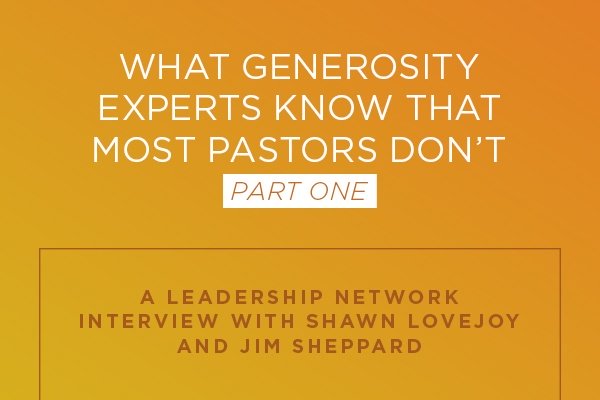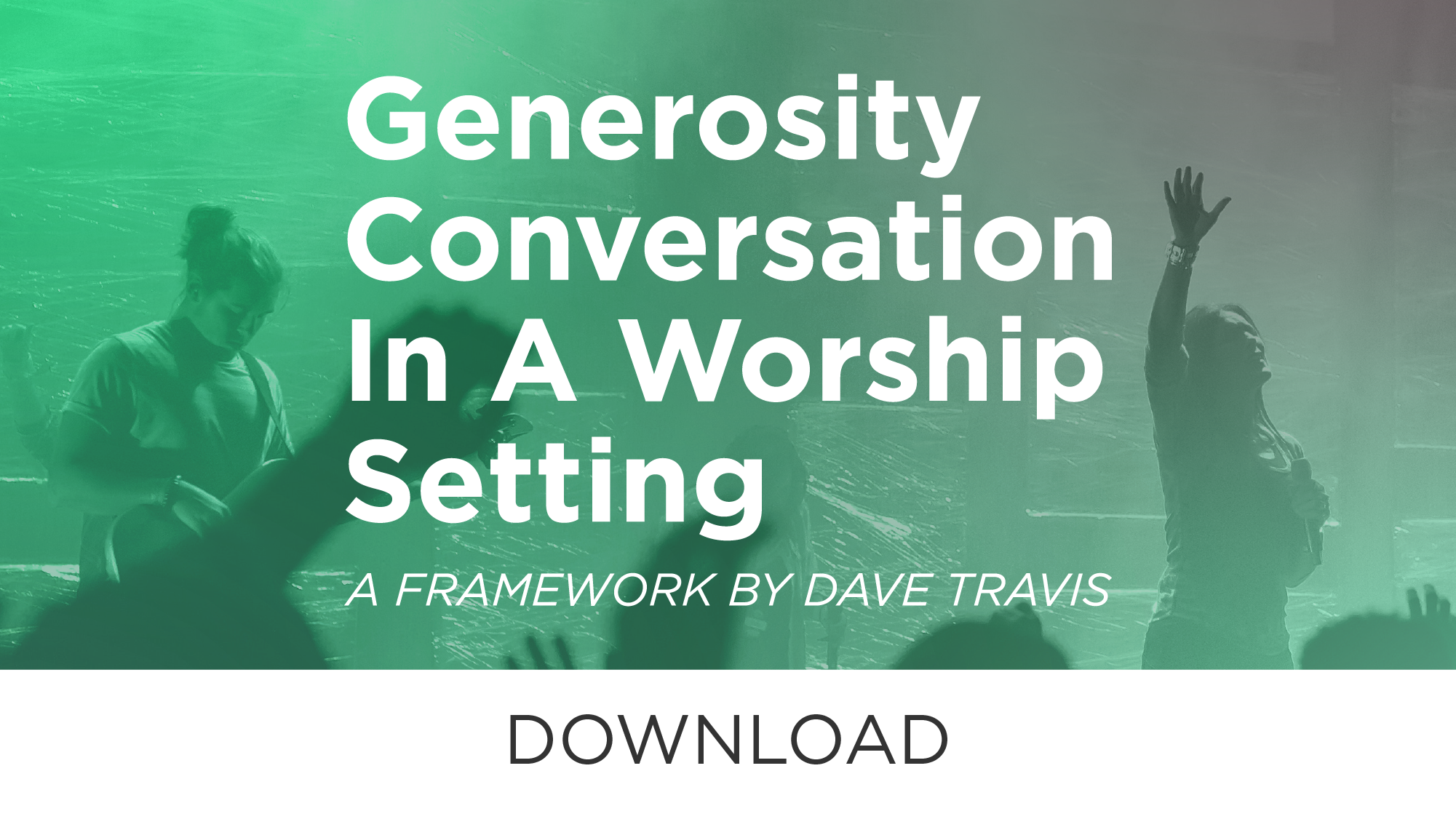The following article is from Leadership Network's blog: What Generosity Experts Know that Most Pastors Don’t and was written by Chris Willard and Warren Bird.
Shawn Lovejoy vividly remembers when he was a young pastor and a $10,000 Saturday-night offering went missing.
“I gathered the team and said, ‘OK, our financial systems are about to be checked,’ ” Shawn says when recalling that punch-in-the-gut night.

The missing money was eventually found in the church safe where it was supposed to be. The experience was a lesson for Shawn then, one that has influenced his coaching of hundreds of pastors since. “You better know what’s going on with the finances in your church,” Shawn says, adding “You’re ultimately responsible, and you lose credibility as a leader if you don’t.”
A successful church planter and pastor, Shawn has spent the past decade-plus coaching pastors across the country. As the founder and CEO of couragetolead.com, Shawn also wrote Be Mean About the Vision: Preserving and Protecting What Matters. We listened in recently as Shawn and Jim Sheppard, Principal of a church generosity consulting company, Generis, and co-author with me of Contagious Generosity, discussed some beneficial lessons learned for church leaders in giving and finance: things generosity experts know that most pastors don’t.
You Can’t Build a Generosity Culture with Non-Believers
When Shawn started Mountain Lake Church in Atlanta at 28 years old and it rapidly grew to megachurch status, he built the church with people who were disconnected from Christ and the church. The only problem with building a church where your first 10 people look like your first 100 and then your first 1,000: Non-Christians and new believers don’t give at significant rates.
“ Dave Ramsey says those folks are spending 127% of their income,” Shawn says. “To get them to a place of living off 90%…that’s a big swing,” Shawn explains. “We had so many non-believers, we had a financial stewardship crisis. We hit a wall.”
Shawn had to play catchup, and began developing leaders to eventually build a generosity culture.
There’s a Fine Line Between Faith and Foolishness
“I’ve found over the years that what men call faith, too often is actually testosterone,” Shawn says with a laugh. Entrepreneurial, driven, hard-charging pastors of either gender have to keep an eye on the fine line between exercising faith in God’s calling, and rushing into something head-strong and foolishly.
“Driven leaders, even if we’re not sure what the Lord wants us to do, sometimes we’ll just pull the trigger anyway,” Shawn says. “If God’s not making something happen, we’ll make it happen.”
Shawn says he learned the hard way in his spiritual and financial leadership journey that God talks much more about wisdom than he does faith when addressing money in Scripture.
“Jesus said, ‘Who sets out to build a building without first estimating the cost?’ So I tell pastors all the time when it comes to budgeting, there’s faith and then there’s foolishness,” Shawn says. “Budget based on wisdom, and then add faith so you make sure you’re not a fool.”
Someone on the Team Needs to Be Great with Numbers
Jim has worked with scores of pastors who are gifted with many skills and talents but managing money is not always one of them.
“They think they’re supposed to be good with numbers along with everything else,” Jim says. “It’s not necessary for the pastor to be good with money, but somebody needs to be able to interpret that for the senior leader. Numbers tell stories.”
Shawn emphasizes having somebody on the team who is strong with financial forecasting, and who lives and breathes spreadsheets, and can paint a clear picture of your church’s financial situation.
“Pastors will hand that off for someone else to do for them, but they don’t have a monitoring system, a dashboard, spreadsheets to monitor what’s going on,” Shawn says. “A lot of leaders have learned it doesn’t matter whether you’re good with numbers or not, you better know what’s going on.”
Spend More Time with Leaders than Followers
Shawn had to fight to model his ministry after Jesus, in terms of getting away from the crowds and the counseling of spiritually needy people, and instead putting focus on investing in leaders. “If the church is going to be successful, it’s going to be a leadership movement,” Shawn shares.
Shawn says with a chuckle that he’s never heard a pastor talk about amazing church growth and exclaim, “It’s because of all this counseling I’m doing.” When they talk about not growing, it frequently goes like this: “I’m spending a large amount of my time with followers, rather than investing in leaders and replicating my leadership in other people.”
“You can’t be available all the time to everyone,” Shawn says. “Don’t be a doer, be a developer.”
Share this
Previous story
← Generosity & Effective Church Financial Leadership
Next story
Webinar: 4 Types of Donors at Your Church →
You May Also Like
These Related Stories
How much should you speak of generosity issues in a worship setting?


How much should you speak of generosity issues in a worship setting?
1
min read
How to Turbocharge Your Culture of Generosity
.png)
.png)
How to Turbocharge Your Culture of Generosity
4
min read
A Capital Campaign Round Table Discussion


A Capital Campaign Round Table Discussion
1
min read


No Comments Yet
Let us know what you think